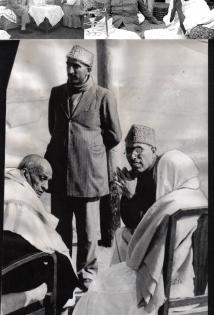When Sardar Patel overruled Nehru to back a Brigadier's gambit in Kashmir
By IANS | Published: October 29, 2022 12:57 PM2022-10-29T12:57:09+5:302022-10-29T13:05:29+5:30
A lawyer by profession, most of his life was spent in agitation for India's freedom, but Sardar Vallabhbhai Patel's ...

When Sardar Patel overruled Nehru to back a Brigadier's gambit in Kashmir
A lawyer by profession, most of his life was spent in agitation for India's freedom, but Sardar Vallabhbhai Patel's equal, if not greater, contribution was quickly transforming into an astute administrator, who made decisive interventions in several key matters, including the early political direction of the first Kashmir war.
His role in painstakingly welding the newly-Independent country a patchwork of British-ruled territory and princely states into an organic whole, and laying the foundations for its efficient administration, are well-known, but the same attributes made him suitable for taking decisions in other fields, including defence.
These attributes included quick comprehension of issues, decisive directions, infallibly ascertaining the calibre of officials on the task and backing them, and a marked lack of desire for pomp and protocol.
Lt. Gen. Lionel Protip 'Bogey' Sen, who as Brigadier then commanded the first major formation in Jammu and Kashmir tasked to tackle and evict the Pashtun tribal raiders from Pakistan, witnessed, and recorded, the Sardar's acute grasp of the situation and quick decision-making.
It was early November 1947. The brave actions of Brigadier Rajinder Singh Jamwal, Chief of Staff of the state forces, had forestalled the raiders' rapid advance, and the gallantry of the Indian Army's Lt. Col. Dewan Ranjit Rai, who led the first formation into the Valley, had prevented Srinagar's fall and kept the airstrip, which was essential to ferry in troops, in Indian hands.
They both laid down their lives even as they achieved their objectives, but the situation was still dangerously uncertain.
Brigadier Sen reached Srinagar on November 2, and on November 4 a day after Major Somnath Sharma's gallant defence of the Badgam airstrip till his last breath was informed that Deputy Prime Minister Sardar Patel and Defence Minister Baldev Singh had landed in the Valley and were on their way to his headquarters.
He recounts, in his memoir "Slender was the Thread", that he took them into the Operations Room for a briefing where he stressed that Srinagar was "very definitely threatened".
"Sardar Baldev Singh was wide awake and had taken in all I said. Sardar Patel had, however, closed his eyes soon after I had begun the briefing and I assumed that he was feeling the effects of the air journey and had fallen asleep. The briefing completed, I therefore looked at Sardar Baldev Singh and asked him a direct question: 'Am I expected to eject the tribesmen from the Valley regardless of the fate that may befall Srinagar, or is the town to be saved?'
"Sardar Patel stirred. The Tiger had not been asleep, and had heard every word of the briefing. A strong and determined man, and one of few words. 'Of course, Srinagar must be saved,' he snapped."
Then, Brig. Sen said that he needed more troops quickly, and "if possible", artillery. Sardar Patel, he recounts, rose and said he was returning to Delhi immediately and "you will get what you want as quickly as I can get them to you".
Seeing them off, he asked the Sardar if he could drive him back to the airfield. "'No, Brigadier,' he replied, 'don't bother to come to the airport to see me off. You have got more important things to do than wasting your time doing that.' He climbed into his own vehicle, and with a wave of his hand, was off."
Brig. Sen wrote that the same evening he was intimated that two more infantry battalions, an armoured car squadron, and a field artillery battery was being despatched to the Valley by road, and the engineers were making the road from Pathankot to Jammu capable of sending large bodies of troops by surface transport.
"Sardar Patel lived up to his reputation as a man of action."
And that wasn't all. As Brig. Sen, the very next day
Disclaimer: This post has been auto-published from an agency feed without any modifications to the text and has not been reviewed by an editor
Open in app